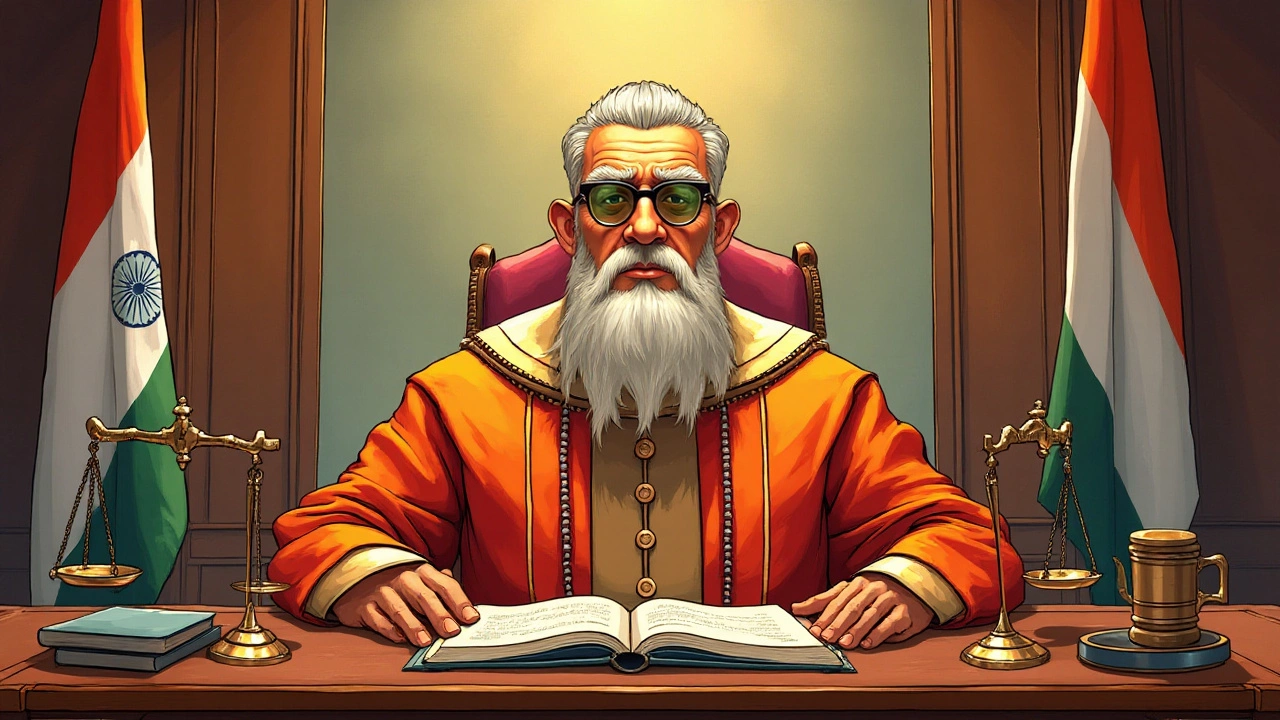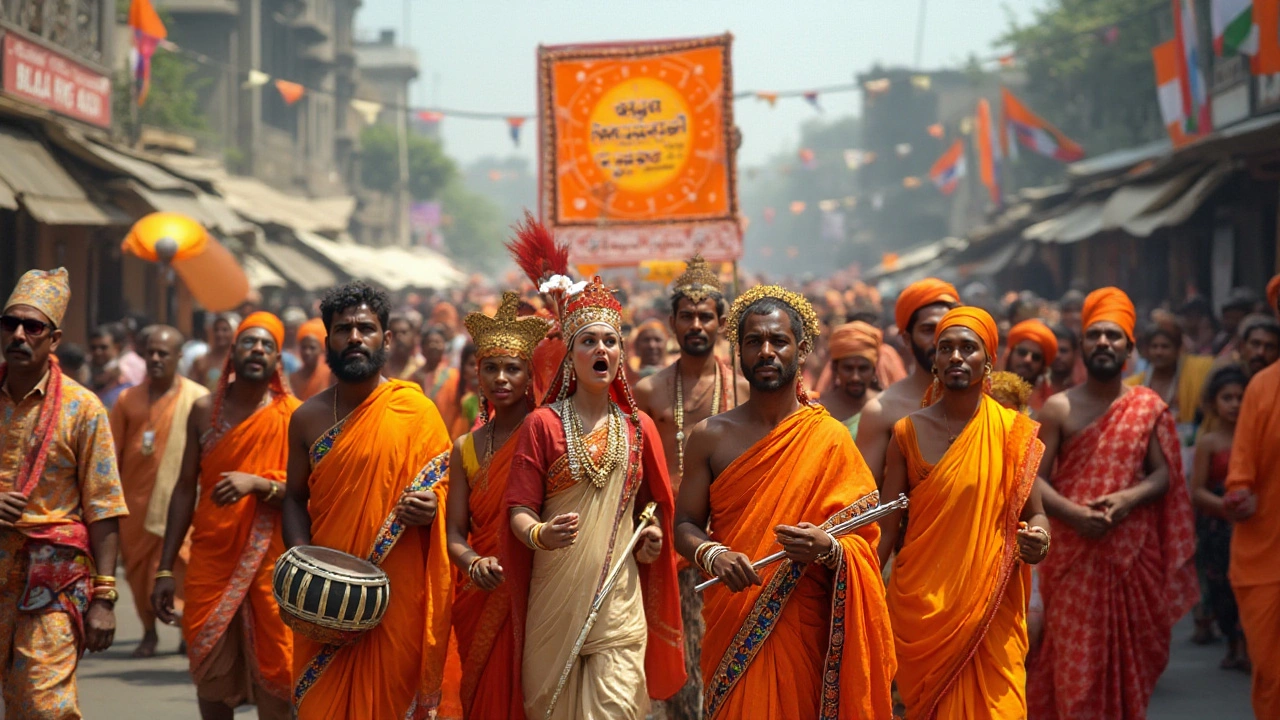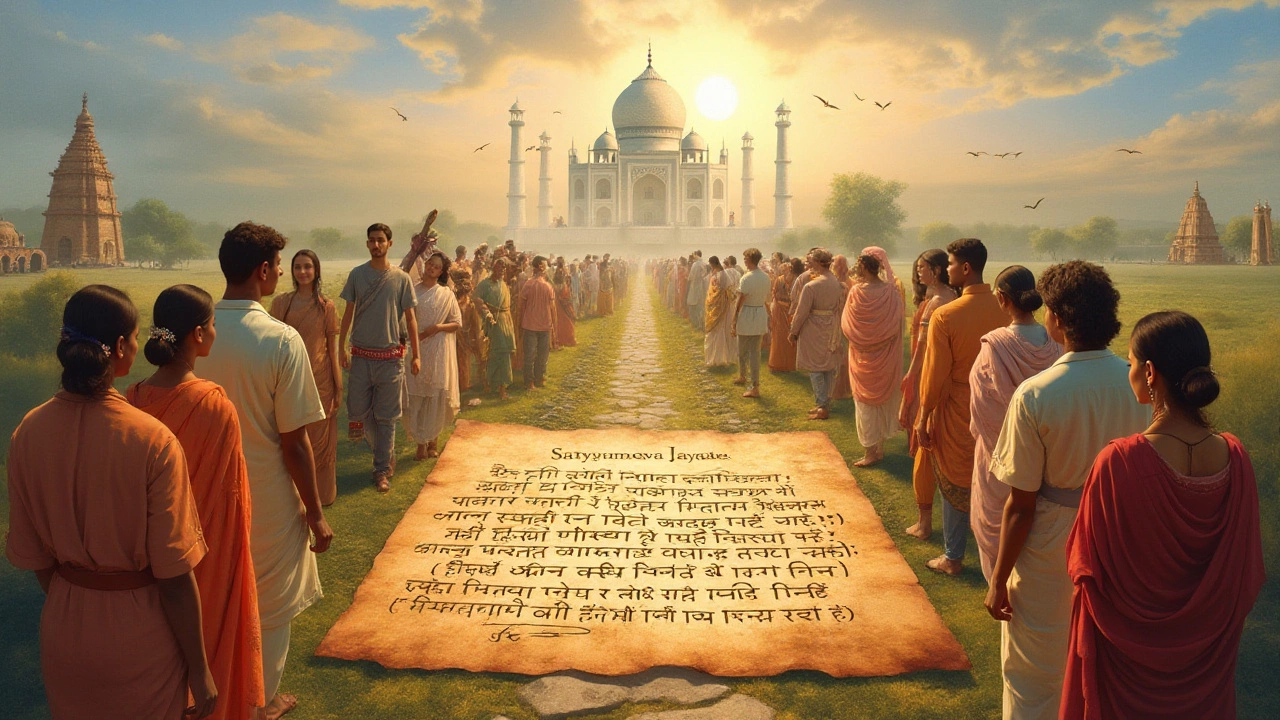India's national slogan, 'Satyameva Jayate,' isn't just a few words strung together; it is a profound message rooted deeply in the country's spiritual and cultural heritage. Translating to 'Truth Alone Triumphs,' it is derived from the ancient Indian scripture, the Mundaka Upanishad. These words are not merely symbolic but serve as a guiding principle woven deeply into the fabric of India's identity.
Every coin and government document in India bears this motto, constantly reminding its citizens of the value placed on truth and righteousness. Such a statement serves as a reflection of the core values cherished by millions across the nation. The article will take you through the origins of this slogan, exploring how its meaning extends beyond politics and governance, inspiring every citizen to lead lives grounded in truth and integrity.
- Origin and Meaning of India's National Slogan
- Historical Context and Adoption
- Cultural Significance and Influence
- Impact on Indian Society and Governance
- Empowering the New Generation
Origin and Meaning of India's National Slogan
Understanding the origin of India's national slogan, Satyameva Jayate, requires delving into the depths of the country's rich cultural and philosophical heritage. Embedded within the ancient texts of the Mundaka Upanishad, one of the primary Upanishadic scriptures, this phrase emerges as a profound declaration of truth's ultimate supremacy over falsehood. In its entirety, the phrase reads, 'Satyameva Jayate Nanritam,' translating to 'Truth alone triumphs, not falsehood.' This spiritual axiom reflects a core tenet of Indian philosophy where truth is perceived not just as a virtue but as a divine path to spiritual liberation. The origins of these words date back to a period ranging between 4th and 5th centuries BCE, a time when Indian sages sought to distill the essence of life through contemplative and philosophical discourse.
The adoption of 'Satyameva Jayate' as India's national slogan wasn't a decision made on a whim. After the country gained independence in 1947, leaders sought out symbols that encapsulated its diverse yet unified identity. The idea was to choose a motto that resonated with the ethos and aspirations of a newly sovereign nation. Officially adopted on January 26, 1950, the day India became a republic, the phrase gained prominence as it was inscribed at the base of the National Emblem. This emblematic integration into the emblem, which itself is a depiction from the Ashoka Pillar at Sarnath, serves a dual purpose. Not only does it embody the moral and ethical compass for governance, but it also roots Indian administrative practices in its spiritual legacy.
It is interesting to note how this slogan is often subtly referenced in varied aspects of life across the country, from political speeches to educational curriculums, reiterating its timeless significance. The choice of these words as a national emblem is particularly noteworthy given India's vibrant mosaic of languages, cultures, and religions, for it acts as a universal truth that transcends these distinctions. The moral weight carried by the notion of 'truth' inspires hope, instills pride, and reinforces the essence of unity in diversity.
"The great secret of true success, of true happiness, is this: the man or woman who asks for no return, the perfectly unselfish person, is the most successful." – Swami Vivekananda
In a world that is constantly changing, 'Satyameva Jayate' stands as a beacon of enduring values. But what exactly is meant by 'truth' in this context? In philosophical discourse, truth isn't merely the absence of lies but a pursuit of the absolute reality, often linked with honesty, integrity, and courage. The persistence of these ideals in the nation's slogan symbolizes the Indian worldview, where truth and justice aren't abstract concepts but achievable ideals. The intention behind this is to encourage citizens to not only embrace truth within their personal lives but also to champion it in public and political spheres. These ideas continue to motivate action toward achieving societal justice and moral clarity across the Indian subcontinent today.
Historical Context and Adoption
The journey of India's national slogan, 'Satyameva Jayate', is as fascinating as the history of the nation itself. This sacred phrase finds its roots in the Mundaka Upanishad, an ancient Indian scripture that dates back to around 2000 BCE. The words ‘Truth Alone Triumphs’ encapsulate a profound spiritual philosophy that has been cherished by sages over the centuries. As India edged toward independence from British rule in the mid-20th century, there was a pressing need to establish and reinforce a national identity, one that could unify the diverse populace under a single banner. The concept of truth, as timeless and universal as it is, was aptly chosen to represent the nascent nation's ethos.
As the Constituent Assembly of India convened to draft the country's constitution, the idea to echo the spirit of truth and justice became central. On January 26, 1950, when India formally adopted its constitution, 'Satyameva Jayate' was enshrined at the base of the national emblem, which depicts the Lion Capital of Ashoka. This emblem itself is a significant symbol from the period of Emporer Ashoka, known for his propagation of Buddhism and emphasis on moral governance. The selection of the slogan was not merely ceremonial; it was envisioned as a representation of India’s commitment to truth and ethical righteousness.
Dr. Rajendra Prasad, who was the first President of India, eloquently articulated the importance of these words.
"The adoption of 'Satyameva Jayate' from the ancient scriptures reflects our reverence towards truth, which should guide our nation's conscience,"he once remarked. His insight reinforced the importance of these words at a time when the young nation was struggling to emerge from the shadows of colonial rule. The slogan served as a clarion call to imbibe honesty and transparency at all levels of Indian governance and civil society. Such historical context shows the deep impact and deliberate intention behind choosing these words, linking modern-day policies with ancient wisdom.
The adoption of 'Satyameva Jayate' resonated deeply with a population that had been suppressed under years of colonialism. It was a declaration to the rest of the world that India, despite its vast diversity and history of invasions, would forge a path based on truth and moral integrity. Today, as these words are etched on India's emblem, they serve as a continuous reminder to uphold these ideals. They inspire numerous initiatives and legislative measures focused on bringing transparency and accountability into governance, as well as in other sectors across the nation. Thus, the historical context and subsequent adoption of this phrase are not just about honoring the past but a commitment to continually strive towards a just and equitable society.

Cultural Significance and Influence
The national slogan of India, 'Satyameva Jayate', carries a deep cultural resonance that echoes through the corridors of the nation’s diverse societies. Stemming from ancient Hindu scriptures, these words were first adopted in the emblem of India after gaining its independence, reflecting a time when the nation yearned for identity and purpose. The slogan doesn't just stand as a symbol but as a philosophical beacon directing individuals towards a path of righteousness and integrity. This cultural importance is underlined by its ubiquity; whether seen engraved on currency or spoken in solemn declarations, it inhabits India's collective consciousness and reminds us of the values integral to its rich heritage.
The influence of this slogan extends to various facets of Indian life. From education to governance, the commitment to truth plays a pivotal role. You'll often find students being taught the significance of truthfulness and transparency as foundational values in their upbringing. These teachings help nurture a sense of moral responsibility among the youth who are encouraged to uphold these values in their professional and personal lives. A noted philosopher once mentioned, "Truth is not just the absence of lies but a diligent pursuit of authenticity," which resonates profoundly with the ethos embedded in India's culture.
In festivals and cultural narratives, truthfulness is a message recurrently echoing through India's cultural practices. The epic stories from ancient texts emphasize truth as a guiding principle for the protagonists. These stories are celebrated through festivals like Diwali, where the victory of good over evil, light over darkness, is inherently the victory of truth. During these times, people reflect not just on their actions but also on their commitment to truth in their lives, further embedding the influence of the slogan in society. This reflection is not limited to individuals and often finds its way into Indian politics, where it serves as an aspirational standard, albeit not always achieved.
India as a country has witnessed its share of moral conflicts and dilemmas. Yet, in the face of such challenges, the ideal of 'Satyameva Jayate' stands as a reminder of the collective conscience. It's a stirring call for accountability and integrity that transcends beyond spiritual significance; it is, in many respects, a secular ethos for governance. Public movements and grassroots campaigns often invoke this motto, calling for transparency and truth in government dealings and decision-making processes. This, in turn, raises awareness and fosters public demand for accountability, driving Indians to aspire toward higher ethical standards.
It is fascinating to observe that the influence of ‘Truth Alone Triumphs’ persists in modern times, encouraging citizens to question, debate, and assert their rights. The slogan's ability to inspire activism and accountability demonstrates its enduring relevance. As such, it remains a motivational force in the social and political landscape of India, continually nurturing the belief that in the age-old struggle between truth and deception, it will indeed be the truth that prevails. In a rapidly changing world, this enduring mantra reminds us all that truthfulness is a virtue to be upheld, cherished, and pursued with unwavering dedication.
Impact on Indian Society and Governance
The national slogan of India, 'Satyameva Jayate', permeates various dimensions of Indian society and governance, serving as more than just a ceremonial phrase. Its profound declaration of truth prevailing over falsehood resonates deeply within the Indian democratic framework, influencing policies and public expectations. The slogan acts as a benchmark, holding governing bodies accountable and encouraging leaders to uphold a standard of ethics that aligns with this age-old value. As authorities strive to enhance transparency and accountability, the spirit of 'Truth Alone Triumphs' becomes a guiding force in legislative processes, where decision-makers are reminded of their duty to maintain integrity.
Within Indian society, this venerable motto emphasizes a collective value system that prizes honesty and justice. Communities often draw upon its message to resolve conflicts, champion social justice causes, and foster a culture of inclusivity. The younger generation, navigating a world rife with challenges, finds inspiration in this mantra, shaping personal values and career paths that prioritize authenticity and fairness. Schools and educational institutions frequently incorporate teachings about 'Satyameva Jayate' in their curriculum, instilling a sense of ethical responsibility from an early age.
Interestingly, the slogan shares its sentiments with other Indian philosophical teachings, echoing the foundational elements of various social reform movements throughout history. Figures like Mahatma Gandhi and B.R. Ambedkar have drawn upon this ethos of truth, underpinning their revolutionary ideas that have guided India's journey. As
"Truth is not only to be pursued as an end but practiced as a way of life," one might recall reflections by great thinkers that consistently echo through India's carvings of progress.This slogan perpetuates an ongoing dialogue within public discourse, urging citizens to question power structures while emboldening individuals to seek the truth boldly.
In governmental settings, the impact of 'Satyameva Jayate' manifests visibly in legal frameworks and public policies. Lawmakers frequently cite this principle when crafting regulations aimed at curbing corruption, encouraging reforms, and safeguarding human rights. As India attunes to global standards, these words of wisdom aid in aligning national ambitions with ethical practices. There is a growing emphasis on fostering environments where truthfulness is not just heralded but actively practiced at all levels of governance. Studies indicate that regions actively advocating transparency report higher citizen satisfaction, suggesting that these cultural values hold transformative power.

Empowering the New Generation
India's national slogan, 'Satyameva Jayate', holds a significant place in inspiring and empowering the new generation. With its roots deeply entrenched in the ancient texts of the Upanishads, this mantra offers a unique blend of historical resonance and contemporary relevance. As young Indians navigate a rapidly changing landscape marked by technological advancement and global interconnectedness, the timeless wisdom of this slogan serves as both a beacon and a grounding force. Today's youth, armed with digital tools and access to unprecedented information, are in a unique position to champion the core value of 'truth' embedded in these words. It encourages them to not only seek the truth but to uphold it in their personal and professional lives, embodying a spirit of integrity in every endeavor.
In an age where misinformation can spread like wildfire, the younger generation stands at the forefront of digital revolutions, poised to leverage their skills to foster communities centered around authenticity and transparency. The motto acts as a clarion call, urging them to utilize their platforms and voices to advocate for justice and equity, hallmarks of the Indian democracy mirrored by this slogan. A powerful reminder of this can be seen in grassroots movements and campaigns led by young activists, which highlight pressing issues such as climate change, social justice, and political accountability. They are not merely raising awareness; they are generating tangible change driven by a collective pursuit of truth and righteousness.
Educational institutions across India have also embraced the spirit of 'Satyameva Jayate', incorporating its principles into curricula that emphasize ethics, moral reasoning, and civic responsibility. Through innovative projects and engaging discussions, students are encouraged to explore the practical implications of these ideas in their daily lives. By encouraging students to critically evaluate and challenge the status quo, educators are fostering a new generation of leaders who prioritize ethical decision-making and value-driven leadership. This approach not only prepares them for challenges within their nation but also positions them to be global citizens who champion values of truth and justice beyond India's borders.
"The philosophy of 'Satyameva Jayate' urges us to prioritize truth in all our actions, a value that is indispensable for the youth aspiring to drive societal progress," states Dr. Radhika Mukherjee, a leading educator and social reformer, emphasizing its importance.
Incorporating such ideas into the fabric of society ensures that the new generation is not only aware of their rich cultural heritage but also equipped to address the complex problems of the modern world. They carry with them the torch of truth, striving to illuminate areas of darkness and ignorance with informed perspectives and ethical diligence. By doing so, they contribute to a more balanced and equitable world, reflecting the enduring power of India's national slogan as a force for positive change.
